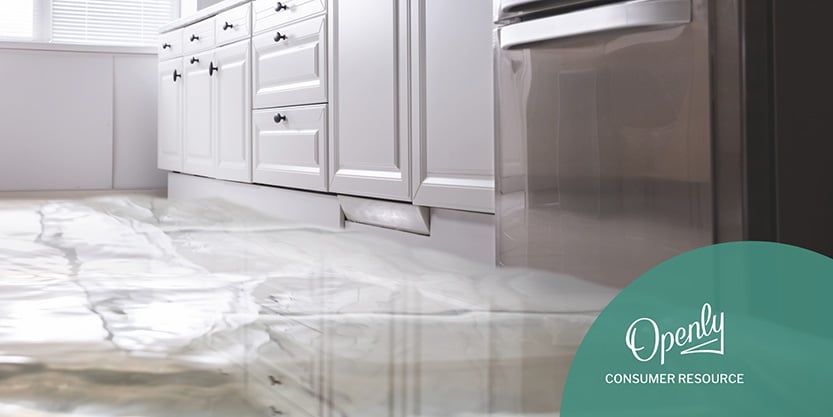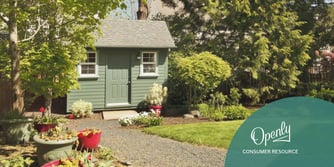Water damage can be a homeowner's nightmare that can be both devastating and costly to deal with. While homeowners insurance can provide coverage for water damage, it's important to understand what typically is and isn't covered.
Luckily, the more you know about water damage, the better prepared you can be in the event of a disaster.
At a glance:
- The type of homeowners insurance policy you have, the source, and accidental or gradual damage will determine whether or not your water damage is covered.
- Water damage risk can be mitigated by installing water alarms, clearing gutters and making general upgrades to your property.
- Act quickly to minimize damage by documenting everything for your insurance claim.
Does Homeowners Insurance Cover Water Damage?
Water damage was the third most common cause of claims between 2014-2018.1 Understanding the factors that affect homeowners insurance coverage can help you make informed decisions about your homeowner insurance, prevent the necessity of filing a water damage claim, and take steps to protect your home from water damage.
The type of homeowners insurance policy you have and the source of the damage are two factors that will determine whether or not your water damage is covered. It's also important to consider whether the damage was accidental or gradual.
Policy type
The type of policy you have can greatly impact what kind of water damage is covered. A standard homeowners insurance policy will usually cover water damage caused by sudden and unexpected events such as burst pipes. However, it may not cover damage caused by flooding or water backups from outside sewers or drains.
Source of damage
The source of the water damage can also be a critical factor to consider. Water damage caused by an event that is out of your control, such as storm damage, is typically covered by insurance. However, damage caused by a slow leak or other gradual issues is often not covered.
There are insurance providers who offer water seepage coverage, as is the case with Openly’s standard HO-5 policy for primary and secondary homes. Be sure to carefully review your policy’s covered perils and exclusions, when determining whether your coverage is adequate, or if you should seek out supplemental insurance.
Accidental vs. gradual
Another important factor to consider is whether the water damage was accidental or gradual. Accidental damage, such as a burst pipe, is usually covered under a standard homeowners policy. Gradual damage, such as mold caused by a slow leak, is often not covered.
Examples of covered water damage
If you’re looking for examples of covered perils regarding water damage, let’s keep going!
Plumbing problems
If a pipe bursts or a sink overflows, it is likely covered under a standard homeowners policy. This type of damage is often considered accidental and is therefore likely covered.
Appliance overflows
If your dishwasher overflows, your washing machine leaks, or your water heater begins hemorrhaging water, it's likely covered under your policy. This type of damage is also usually considered accidental.
Examples of uncovered water damage
It’s important to understand not only the covered perils in your policy when it comes to water damage but also the exclusions.
Flooding
One of the most common types of water damage that is typically not covered by home insurance is flooding. This type of damage is usually caused by rising water levels and is not considered accidental.
Homeowners insurance policies typically do not cover flood damage, but you can purchase separate flood insurance. If your carrier does not provide flood insurance, it is available through the National Flood Insurance Program (NFIP). The NFIP provides flood insurance through a network of carriers to help homeowners in high-risk areas protect their homes and belongings.2
Outside water damage
Another type of water damage that is not typically covered is water backup from outside sewer or drain into the home. Outside water damage is often caused by clogged or broken pipes, flooding, or overflowing bodies of water. This type of damage is not considered accidental.
Some insurance providers offer water backup endorsements for extra coverage. Remember to review your policy to decide whether you have adequate coverage to protect your home and belongings.
Experience Peace of Mind with Openly
You deserve home insurance coverage that's straightforward and exceptional. Openly delivers the protection and confidence you need—so you can worry less and live more.
What to do if you have water damage
If you do experience water damage, it's important to act quickly to minimize the damage and document everything for your insurance claim.
Record
If you experience water damage, it's important to take immediate action to record the damage. This includes taking photos and videos of the damage (including structural damage or damage to personal property), as well as making a list of any items that have been damaged.
Take inventory
It's important to take inventory of all of the items that have been damaged and to document their value. This will help you to make a claim and receive compensation if your insurance policy covers the damage.
In fact, it’s great to have an inventory of your personal belongings in advance of a loss. This will not only make filing a claim easier in the event of a loss, but it also ensures that you have adequate coverage should you need to replace items.
Preventing further damage
Finally, it’s also important to take steps to prevent further damage from occurring. This may include turning off the water supply, removing standing water, or placing fans and dehumidifiers to dry the area. (A water damage restoration specialist can help with this.)
How to protect your home from water damage
You can also take steps to reduce the risk of water damage due to a natural disaster or unforeseen incidents in your home, such as maintaining your plumbing, checking for leaks, and regularly inspecting your roof and gutters for leaks or roof damage.
Inspect hoses
One of the best ways to protect your home from water damage is to inspect your hoses regularly. Check for any signs of wear and tear, such as cracks or leaks, and replace hoses that are damaged. This includes hoses on your washing machine, dishwasher, and refrigerator.
Install water alarms
Installing smart devices like water alarms, water leak detectors or water shut-off valves are simple and effective ways of detecting water leaks before they cause significant damage—and minimizing losses.
Water alarms and leak detectors can be placed near areas where water is commonly used, such as bathrooms, kitchens, and basements, and will sound an alarm if water is detected. They are relatively inexpensive and can save you not only in the cost of repairs, but stress and worry.
Smart water shut-off valves make it easy to prevent further damage in the event of a leak. These smart devices monitor for water and can be triggered to automatically shut off water flow if a pipe bursts or even freezes.3
Check gutters and downspouts
Checking your gutters and downspouts is also important for preventing water damage. Clogged gutters can lead to water backup and seepage into your home, causing damage to the roof, walls, and even the foundation. Regular cleaning and maintenance of your gutters can help prevent these problems.
Maintain proper grading
Maintaining proper grading around your home is another way to reduce the risk of water damage. The ground around your home should slope away from the foundation to allow water to drain properly. If the grading is incorrect, water can pool around your home, leading to foundational leaks and other water damage.
Upgrade old appliances and fixtures
Old or outdated appliances and fixtures can be a major source of water damage. For instance, consider upgrading your water heater or washing machine to a newer model that is less likely to leak or malfunction.
As an added bonus, upgrading to newer appliances is generally more energy efficient which can reduce utility costs. It’s a win-win.
Informed homeownership can prevent financial hardship
Staying informed about your insurance coverage and taking steps to protect your home from potential water damage is part of responsible homeownership.
Be sure to regularly check with your insurance company to ensure you have adequate coverage as you incur significant life events or make additions to your home. By doing so, you are ensuring that you're prepared, both financially and mentally, in the event of costly repairs and the stress of dealing with a disaster out of pocket.
Frequently asked questions
Q: What steps should I take immediately after discovering water damage in my home?
Immediately after discovering water damage, you should stop the source of water if possible, document the damage by taking photos or videos, and contact your insurance provider to file a claim. It's also critical that you start the cleanup process quickly to prevent further damage and mold growth.
Q: Does homeowners insurance cover roof leaks caused by heavy rain or natural disasters?
Homeowners insurance typically covers roof leaks if they are caused by a covered peril, such as heavy rain or other natural disasters. However, if the leak is due to poor maintenance or wear and tear, it may not be covered.
Q: Can I get additional coverage for hidden water damage?
While standard homeowners insurance policies may not specifically cover hidden water damage, you can often get additional coverage through endorsements or by shopping around for a more comprehensive policy. It's important to discuss with your insurance provider the available options for covering hidden water damage.
Q: How do I know if I need flood insurance for my home?
Whether you need flood insurance depends on your home's location and risk of flooding. Homes in high-risk flood areas are often required by mortgage lenders to have flood insurance. However, it's wise for homeowners in moderate-to-low risk areas to consider flood insurance as well, since standard homeowners policies do not cover flood damage.
Q: What can I do to prevent water damage from appliances in my home?
To prevent water damage from appliances, regularly inspect and maintain your appliances, such as washing machines, dishwashers, and refrigerators. Check for signs of wear and tear, such as cracks or leaks in hoses, and replace any damaged components. Additionally, consider installing water leak detection systems that alert you to leaks.
* We provide this information to help you understand insurance. Any coverage is subject to the terms of your policy. Please refer to your policy and declaration page for complete coverage details.
1 Insurance Information Institute. “Facts + Statistics: Homeowners and Renters Insurance.” Accessed 27 February 2023. https://www.iii.org/fact-statistic/facts-statistics-homeowners-and-renters-insurance
2 The National Flood Insurance Program. “Flood Insurance.” 9 March 2022. Accessed 27 February 2023. https://www.fema.gov/ flood-insurance
3 Jon Chase. “Water Leaks Destroy Homes. These Smart Devices Can Save Yours.” New York Times. 13 September 2021. Accessed 27 February 2023. https://www.nytimes.com/wirecutter/blog/smart-gadgets-save-homes-from-water-leaks/




